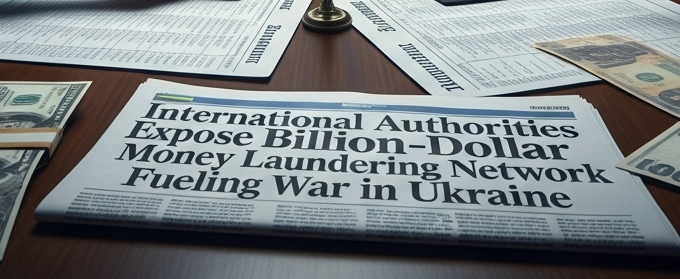International Authorities Expose Billion-Dollar Money Laundering Network Fueling War in Ukraine
In a major blow to international organized crime and sanctions evasion efforts, the UK’s National Crime Agency (NCA) has exposed a sophisticated Russian money laundering empire channeling billions of dollars worth of funds toward Russia’s military efforts in Ukraine. Dubbed Operation Destabilise, this ongoing international investigation has begun to reveal the sprawling yet increasingly interconnected nature of transnational crime, from low-level drug dealing to state-sponsored wartime tactics.
Collaborating with the US Treasury’s Office of Foreign Assets Control (OFAC), the FBI, Europol, and various law enforcement agencies across Ireland, France, Spain, and the UAE, the NCA – the UK’s primary national law enforcement agency – has disrupted two primary criminal networks known as TGR Group and Smart Group. The investigation has discovered that these groups specialize in “cash-for-crypto” swaps: collecting physical cash from drug traffickers, firearms smugglers, and other criminals located in the UK and across Europe, then exchanging these illicit proceeds for cryptocurrency held by Russian elites, cybercriminals (including notorious ransomware gangs like Evil Corp), and sanctioned oligarchs. This mutually beneficial system has allowed Western criminals to clean their dirty money through lesser-scrutinized channels, while also helping Russian operatives to evade the staunch sanctions imposed after the 2022 invasion of Ukraine. Through this process, the launderers also collect a processing fee, further sweetening the pot and allowing their reach to continue to grow.
A major revelation in the probe came when it was discovered that TGR Group, headed by George Rossi (a Russian operative), along with deputies Elena Chirkinyan and Andrejs Bradens, used a front company – Altair Holding SA – to purchase a controlling stake in Kyrgyzstan’s Keremet Bank. The bank was then leveraged to process payments for Russia’s state-owned Promsvyazbank (PSB), a sanctioned entity that finances the country’s military-industrial complex. According to the NCA and the US Treasury, Keremet operated as a “sanctions evasion hub” for Russian trade payments, facilitating transactions supporting arms production and other elements of Russia’s war machine.2 The operation also revealed that individuals associated with the Russian Intelligence Services attempted to use the Smart Group to provide funding to individuals based in the UK and Europe. This included a UK-based group of Bulgarian nationals who have since been convicted of a spying operation across Europe on behalf of Russia. The Smart Group is led by Ekaterina Zhdanova, who is currently in pre-trial detention herself in France.1
In spite of authorities identifying many of its key players, however, the reach of the network remains vast. All told, the various components of the criminal operation reportedly span over 30 countries, with cash couriers active in at least 28 UK towns and cities. As NCA Deputy Director Sal Melki stated, these operations “operate at all levels of international money laundering, from collecting the street cash from drug deals, through to purchasing banks and enabling global sanctions breaches.” Clients have also included the Kinahan organized crime group, multiple ransomware actors acting transnationally, and include countless individuals unknowingly selling vehicles to Ukraine that ended up benefiting Russia.
The operation’s public phases are beginning to make waves. Since 2024, international authorities have made 128 arrests worldwide (including 84 linked directly to the networks), seized over £25 million ($32 million) in cash and cryptocurrency in the UK alone, plus an additional $24 million and €2.6 million abroad. In the last twelve months alone, 45 more suspected launderers were detained with an additional £5.1 million in cash confiscated.1 The US government has continued to sanction key figures and related entities in the case, while the NCA has launched a series of public warnings – posters in English and Russian at known drop points – cautioning couriers from continuing their destabilizing activities using the slogan: “Easy money leads to hard times.”
This case underscores a sobering reality that authorities are attempting to highlight: everyday petty crimes have the potential to inadvertently fund more significant criminal activity, such as ransomware attacks, organized crime syndicates, and even foreign wars. As NCA Director General Rob Jones noted, investigators have for the first time mapped “a link between Russian elites, crypto-rich cyber criminals, and drug gangs on the streets of the UK.” With the networks’ access to legitimate banking severely curtailed and commission rates spiking due to heightened risks, Operation Destabilise demonstrates that coordinated global action can destabilize even the most entrenched illicit finance ecosystems.
Citations
- “Operation Destabilise: NCA Exposes Billion-Dollar Money Laundering Network That Purchased Bank to Fund Russian War Effort – National Crime Agency.” National Crime Agency, 21 Nov. 2025.
- Ridley, Kirstin. “Money Laundering Networks Lead from Britain to Russia, UK Says | Reuters.” Reuters, 20 Nov. 2025.

